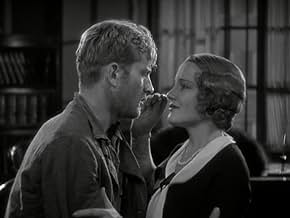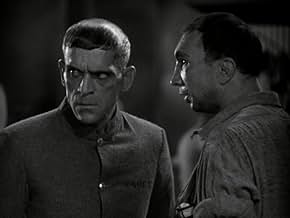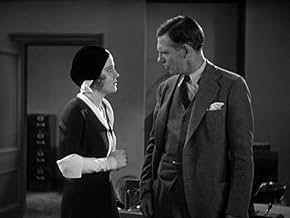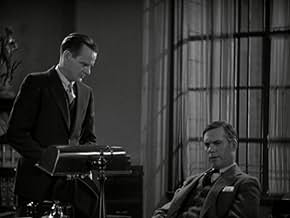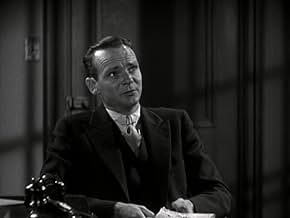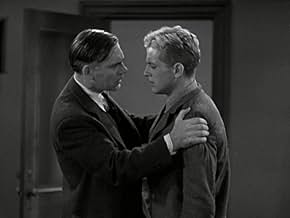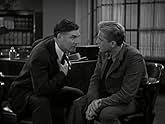PUNTUACIÓN EN IMDb
6,9/10
1,5 mil
TU PUNTUACIÓN
Tras un intento fallido de presentarse a las elecciones a gobernador, el fiscal Mark Brady es nombrado alcaide de la prisión estatal donde están encarcelados muchos de los criminales a los q... Leer todoTras un intento fallido de presentarse a las elecciones a gobernador, el fiscal Mark Brady es nombrado alcaide de la prisión estatal donde están encarcelados muchos de los criminales a los que procesó.Tras un intento fallido de presentarse a las elecciones a gobernador, el fiscal Mark Brady es nombrado alcaide de la prisión estatal donde están encarcelados muchos de los criminales a los que procesó.
- Nominado para 1 premio Óscar
- 1 nominación en total
DeWitt Jennings
- Captain Gleason
- (as De Witt Jennings)
Paul Porcasi
- Tony Spelvin
- (as Paul Porcassi)
Richard Bishop
- Minor Role
- (sin acreditar)
Andy Devine
- Cluck - a Convict with knife
- (sin acreditar)
James Guilfoyle
- Detective Doran
- (sin acreditar)
Frank Hagney
- Prison Guard in Yard
- (sin confirmar)
- (sin acreditar)
Argumento
¿Sabías que...?
- CuriosidadesThe prison yard sequence was shot at M-G-M, using the set originally built for "The Big House" (1930).
- PifiasPaul Porcasi's name is spelled "Porcassi" in the opening credits.
- Citas
Mark Brady: [to Graham] Tough luck, Bob, but that's the way they break sometimes. You got to take them the way they fall.
- Créditos adicionalesThe film's credits do not say that Howard Hawks directed the film; instead, they say that the film is "A Howard Hawks Production."
- ConexionesAlternate-language version of El código penal (1931)
Reseña destacada
The lessons unlearned belong to Walter Huston's character, Mark Brady, but I'll get to that later.
Philip Holmes plays Robert Graham, a young man of twenty who gets into an altercation in a dance hall and ends up killing the other guy, someone he's never even met before. D.A. Mark Brady is not a man without compassion. He even states how, were he the defense attorney, he would get the boy off without serving a day. As a result, he sends him up for manslaughter rather than murder. However, that is still ten years, and six years into the sentence Graham is a man who is losing hope and his sanity.
In an odd twist of fate D.A. Mark Brady becomes warden of the prison, a place inhabited by many of the men he helped convict. The prison doctor comes to Brady with a request - let Graham be Brady's private driver for awhile, to get him out of the prison factory. Brady agrees. A few short months later and Graham is beginning to have a new lease in life. Plus, there is a complication - he is falling in love with Brady's daughter. However, an event soon occurs at the prison that threatens Graham's hope for a better future.
As for the lessons unlearned, the one quirky thing about this film is how D.A. turned prison warden Brady keeps saying "you've go to take things how they break", never realizing that in many cases - exhibit A being the case of inmate Robert Graham - Brady is in total control of how things break, in particular the fact that Robert Graham, a basically square kid, is an inmate in the first place. However, at least Brady is not a hypocrite, since he seems to be willing to take the good with the bad in his own life as well. A pretty complex character for an early 30's film.
Of course all classic movie fans are familiar with Walter Huston and his many abilities and roles. However, most people will not have heard of Philip Holmes. Partly this is because his early successes in film did not lead to better things as the 1930's progressed, and the rest of the reason is that many of his early successes occurred at Paramount, whose early films have been largely unseen for decades. This is worth checking out. The screenplay was nominated for an Oscar, and the performances are quite good.
Philip Holmes plays Robert Graham, a young man of twenty who gets into an altercation in a dance hall and ends up killing the other guy, someone he's never even met before. D.A. Mark Brady is not a man without compassion. He even states how, were he the defense attorney, he would get the boy off without serving a day. As a result, he sends him up for manslaughter rather than murder. However, that is still ten years, and six years into the sentence Graham is a man who is losing hope and his sanity.
In an odd twist of fate D.A. Mark Brady becomes warden of the prison, a place inhabited by many of the men he helped convict. The prison doctor comes to Brady with a request - let Graham be Brady's private driver for awhile, to get him out of the prison factory. Brady agrees. A few short months later and Graham is beginning to have a new lease in life. Plus, there is a complication - he is falling in love with Brady's daughter. However, an event soon occurs at the prison that threatens Graham's hope for a better future.
As for the lessons unlearned, the one quirky thing about this film is how D.A. turned prison warden Brady keeps saying "you've go to take things how they break", never realizing that in many cases - exhibit A being the case of inmate Robert Graham - Brady is in total control of how things break, in particular the fact that Robert Graham, a basically square kid, is an inmate in the first place. However, at least Brady is not a hypocrite, since he seems to be willing to take the good with the bad in his own life as well. A pretty complex character for an early 30's film.
Of course all classic movie fans are familiar with Walter Huston and his many abilities and roles. However, most people will not have heard of Philip Holmes. Partly this is because his early successes in film did not lead to better things as the 1930's progressed, and the rest of the reason is that many of his early successes occurred at Paramount, whose early films have been largely unseen for decades. This is worth checking out. The screenplay was nominated for an Oscar, and the performances are quite good.
- AlsExGal
- 8 oct 2010
- Enlace permanente
Selecciones populares
Inicia sesión para calificar y añadir a tu lista para recibir recomendaciones personalizadas
- How long is The Criminal Code?Con tecnología de Alexa
Detalles
- Duración1 hora 37 minutos
- Color
Contribuir a esta página
Sugerir un cambio o añadir el contenido que falta

Principal laguna de datos
By what name was El código penal (1930) officially released in Canada in English?
Responde
